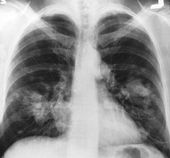|
6/26/2013 More #Research Needs to Be Done On Treatment For #LungCancer Among Non-Smoking #WomenRead NowThis story originally published by Sam Goodwin on HGNG.com on 6/26/13.  The International Association for the Study of Lung Cancer (IASLC) finds that much more research needs to be done on treatment given to non-smoking women for lung cancer. An estimated 516,000 women worldwide are affected by lung cancer and 100,000 of these women are from the United States. Up until now, women with lung cancer have been given the same treatment as men. However, numerous studies have highlighted different characteristics of lung cancer in women. Hence, there is a need for more research to be done on lung cancer treatment given to women, especially those who don't smoke, states the International Association for the Study of Lung Cancer (IASLC). Researchers from the University of Toulouse III in France looked into the clinical, pathological and biological characteristics of lung cancer in 140 women. They found that 63 participants had never smoked in their lives while 77 were either former or current smokers. Researchers compared the findings of both groups and found differential genetic alteration repartition in women according to their tobacco status. Around 50.8 percent of women who had never smoked displayed an EGFR mutation while only 10.4 percent of current/former smokers showed the same mutation. However, 33.8% of current/former smokers showed K-Ras mutation while only 9.5 percent of women who had never smoked showed this form of mutation. The researchers also observed a higher percentage of estrogen receptors (ER) α expression in patients who never smoked when compared with smokers. This led researchers to conclude that lung cancer in women who have never smoked is more frequently associated with EGFR mutations and estrogen receptor (ER) over expression. "These findings underline the possibility of treatment for women who have never smoked with drugs to target hormonal factors, genetic abnormalities, or both," the authors say. The study is published in the July issue of the Journal of Thoracic Oncology.
0 Comments
Your comment will be posted after it is approved.
Leave a Reply. |
Details
|


 RSS Feed
RSS Feed
